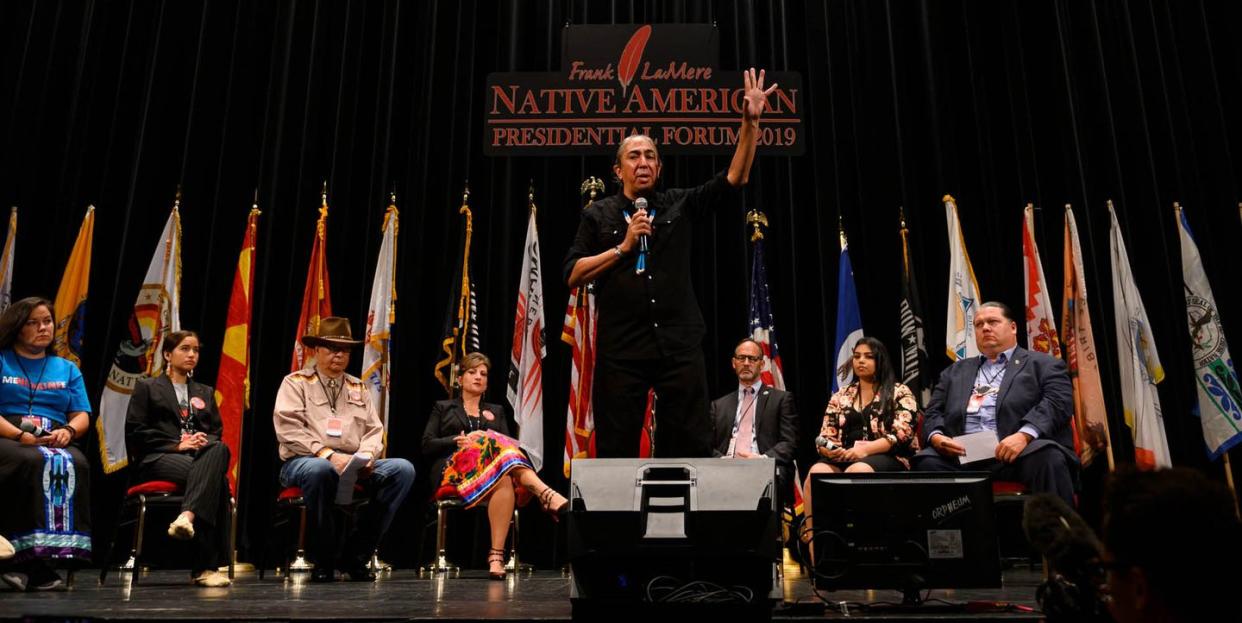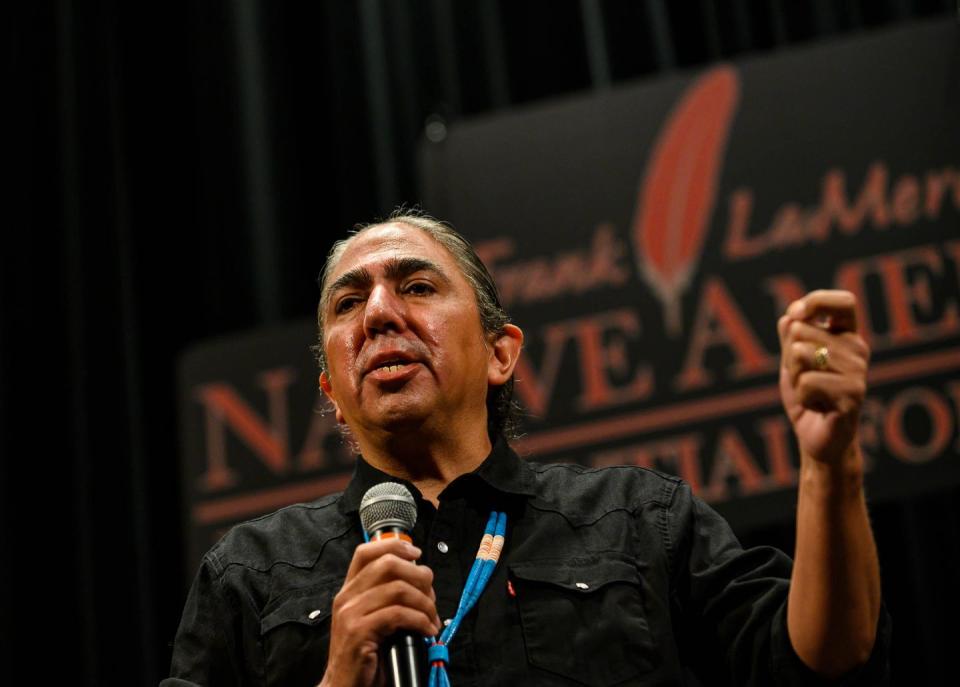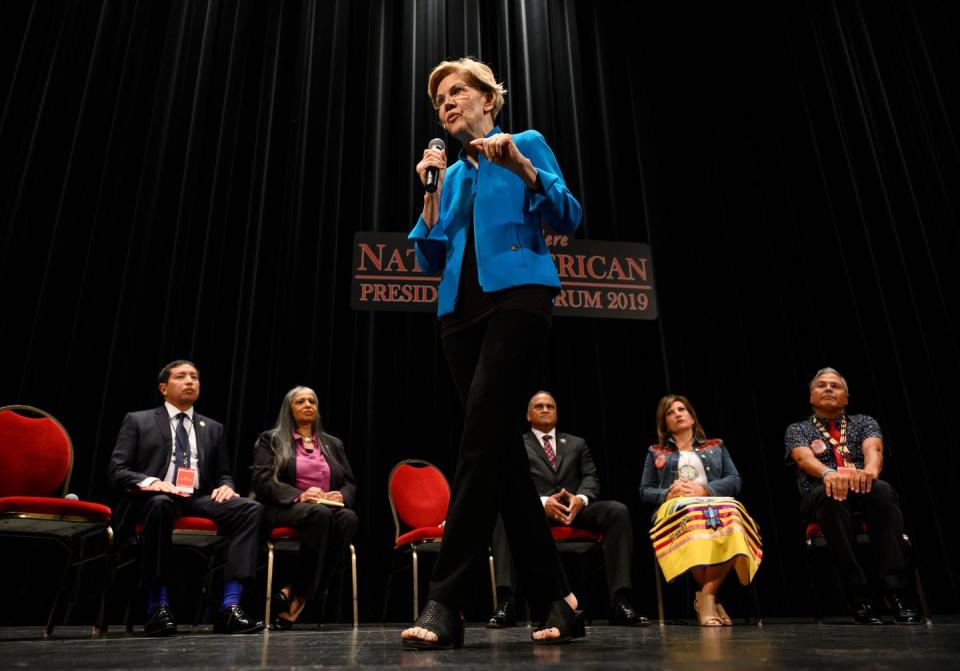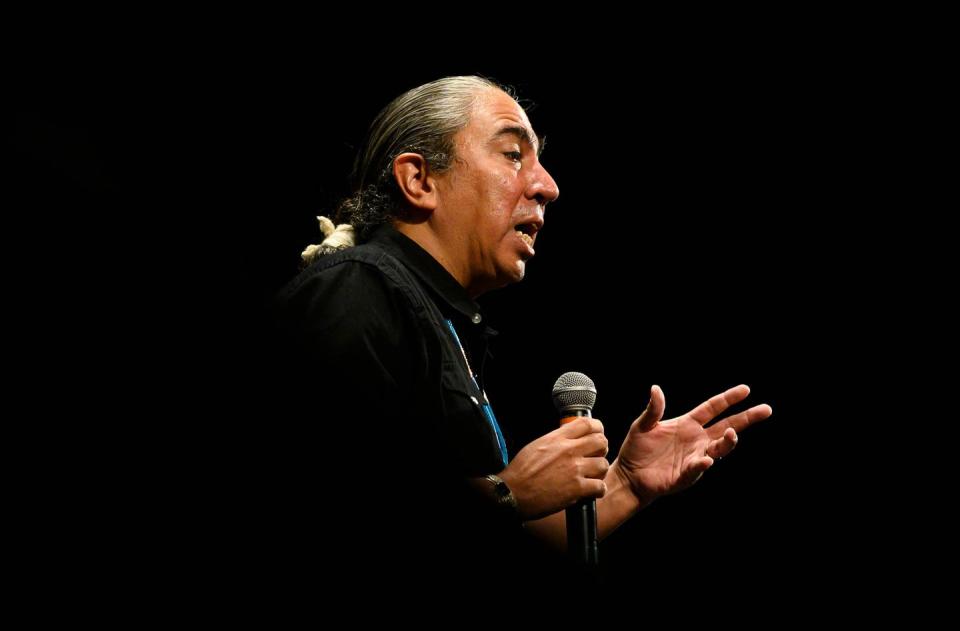Elizabeth Warren Was Well-Received at the Native American Presidential Forum. Mark Charles Was the Main Event.

“The Declaration of Independence refers to Natives as ‘merciless Indian savages,’” said Mark Charles, the only Native American running for president, as he neared the climax of his stump speech at the first-ever Native American Presidential Forum in Sioux City, Iowa. “This makes our Declaration of Independence a systemically white-supremacist document,” he said, enunciating the syllables of “sys-te-ma-ti-cally,” as though the word itself could be broken down into its phonological structures. When he punctuated that line, a few women lele’d at the top of their lungs—a feminine tribal tremolo akin to the snaps you might hear at millennial gatherings these days.
Charles, who wore his hair in a traditional Navajo bun, or tsiiyéé, and sported a turquoise necklace over an all-black outfit—like he was an Indigenous Black Panther, or maybe a Native Johnny Cash—continued to build steam.
The Constitution, he pointed out, only uses male pronouns: no wonder women make 70 cents on the dollar compared to men. The 13th Amendment allows unforced labor for prisoners: slavery, said Charles, endures through mass incarceration. The courts, too: they still base their rulings on the 400-year-old Doctrine of Discovery. Justice Ruth Bader Ginsburg, a liberal icon, even cited the decrepit papal bull in a 2005 decision denying the Oneida Nation’s sovereignty over homelands in Upstate New York. Flanked by eight Native panelists who were seated in front of seventeen tribal flags, two P.O.W.M.I.A. flags, two U.S. flags, and a staff strung with eagle feathers, Charles seemed at home preaching to the predominantly Native crowd gathered in the gilded burgundy and gold interior of the Orpheum Theatre.

“Now, if you have a house that’s built on a bad foundation, you’re going to get cracks in your walls. You’re going to get gaps in your windows. And you’re going to get a creaky floor,” he said, his oration reaching its soaring conclusion. “And you can scream and you can fight about what color to paint the walls, what kind of calking to use in your windows, and what kind of carpet to put on your floor, but until you go into the basement and examine your foundation and do something to firm those up and make those strong—you are never going to fix the problems in the house.” The audience cheered. Some women who had been cautious with their lele’s earlier really let loose.
The first-ever Native American Presidential Forum was yet another sign of Indian Country’s rising political power. In battleground states like Arizona, Michigan, Minnesota, Montana, Nevada, New Mexico, North Dakota and Wisconsin, Native Americans could help select the next president and determine control of the Senate. Casino tribes have become big political donors. Last year, a single Native nation, the Gila River Indian Community, had the third largest lobbying contract on Capitol Hill, according to public records. And in recent years, Indigenous movements, from Standing Rock to Bears Ears to Mauna Kea, have made national headlines. The ballot, the dollar, the protest: these are the ingredients of power. These constituencies played a significant role in the election of the first two Native-American women to Congress: Sharice Davids of Kansas and Deb Haaland of New Mexico, both in 2018. And trends suggest Indian Country will continue to grow its influence in the years to come.
The rise of the First People of this land raises big—even fundamental—questions about the United States, its history, and its democracy. But at the Native American Presidential Forum, the media mostly addressed this question through the prism of the 2020 horse race and the stock of a single candidate: Senator Elizabeth Warren of Massachusetts. To the networks, Indian Country’s power is of interest insofar as it creates headline risk for Warren, who launched her campaign with an ill-advised DNA test intended to clap back at President Trump’s racist callouts by proving a bit of family lore, which holds that the senator has a distant Cherokee or Delaware ancestor. The test was widely criticized, particularly by Cherokee commentators, though it did show that Warren likely had Native ancestry.
To her credit, the Massachusetts senator opened her remarks at the forum by taking the issue head-on with a well-received apology and an expansive Indigenous platform. Despite the attention, the controversy elided a deeper story about how Indian Country is coming to understand and wield its power—and, more fundamentally, what Native people think about our role in a nation, a society, and a democracy superimposed over our homelands and graves. In the era of “Make America Great Again,” these are the issues that Charles is attempting to address with his campaign.

The centerpiece of Charles’ platform is to establish a truth-and-reconciliation-style commission to address the genocide against Native Americans. Charles describes this as a Truth and “Conciliation” process because, as he points out, “reconciliation” implies that relations between Indigenous peoples and the United States were once amicable. Politics, for Charles, is principally about public history and memory. President Trump’s slogan, stitched onto baseball caps across the country, is, of course, a historical claim. Charles argues that the United States must create a “shared past” to forge a more just national community—a view that aligns with the work of prominent historians of nationalism and identity, like Benedict Anderson, Eric Hobsbawm and, more recently, Harvard historian and New Yorker writer Jill Lepore. On the campaign trail, he often says his goal is “to build a nation where ‘We the People’ truly means all the people.”
It’s hard, however, not to see similar intellectual currents underlying the conversation about reparations for the descendants of the enslaved, or even in the Indigenous platforms of Democratic contenders. Warren, for example, is working on a bill with Haaland focused on “Broken Promises” between the federal government and tribes. Former Housing and Urban Development Secretary Julian Castro calls out the federal government’s failure to honor treaties in his own platform. Onstage at the Orpheum, author Marianne Williamson spoke to the need for a project of “national repair.” Senator Bernie Sanders, who visited more tribal leaders than any other presidential candidate in history during his 2016 run, said “the federal government, for years, has turned their backs on your issues and your concerns…nobody listens, and we intend to change that.” Progressives, to their credit, are willing to acknowledge harms against Native peoples.

The difference between Charles and these Democrats lies in the Navajo candidate’s insistence that the wrongs committed are not mere failures, but are instead foundational characteristics baked into a democracy founded in slavery and genocide. His commitment to this idea runs deep. Charles grew up in Gallup, New Mexico, a border town of the Navajo reservation. As an adult, he moved his family to the remote southern part of the reservation, where they lived in a one-room traditional Hogan without running water or electricity, so they could understand the challenges faced by their ancestors. In 2012, Charles hosted the first public reading of the United States' official apology to Native Americans outside the Pool of Reflection at the Capitol Building. The statement, buried deep in a 2009 appropriations bill, had never been read publicly before then. He’s co-authoring a book about public history, tentatively titled Unsettling Truth, and speaks at universities and churches around the country.
Charles used to be a pastor, and it’s not hard to see the influence on his stump speeches. Onstage at the Orpheum, Charles took ten minutes to respond to a question about whether he would rescind the 20 Medals of Honor bestowed upon perpetrators of the Wounded Knee Massacre. “We don’t just need to rescind them—we need to wash the clothes,” he said, in a line that could just as easily have been delivered from a church pulpit as a stage. Without the platform of a major political party, Charles will struggle to find a broader audience for his message, but at the forum, his words were music to many Native Americans’ ears.
Sarah Sunshine Manning, 36, of the Duck Valley Paiute, says she is voting on two issues in 2020: the climate crisis and the rise of white nationalism. The latter issue directly impacted her own family earlier this year, when a white student harassed her son for not putting his hand over his heart during the Pledge of Allegiance. “The impact [the president] has had on stirring up the bee’s nest of white supremacy—it’s going to linger,” Manning told me. It will take a lot, in Manning’s view, to get to the root of the problem: genocidal white supremacy. Charles, she said, is perhaps the only candidate willing to acknowledge the root of the issue.
After taking questions from the media, a young woman came up and shook Charles’ hand. “Pilamayaye,” she said, which means, “Thank you,” in Lakota. She had been homeless for five years, and his comments touched her. A young Navajo man followed shortly behind. “Ya’at’eeh,” he said, which means, “Hello,” in Navajo. He looked into Charles’ eyes and shook his hand. “Thank you.”

Then, Charles and I sat down across a folding table set-up in the media room backstage. As he picked at a fruit plate with a plastic fork, we talked about what it means for a descendant of genocide, and a self-described dual citizen of the Navajo and United States, to run for the highest office in the land.
“What do you do if it turns out that the majority of Americans can’t stomach that truth?” I asked. “What if politics inevitably trades in myth?”
“That’s a very real possibility,” he said, pausing to consider the question. “I’m running my campaign on the hope that that’s not true, but I don’t know the answer to that question yet.”
You Might Also Like

